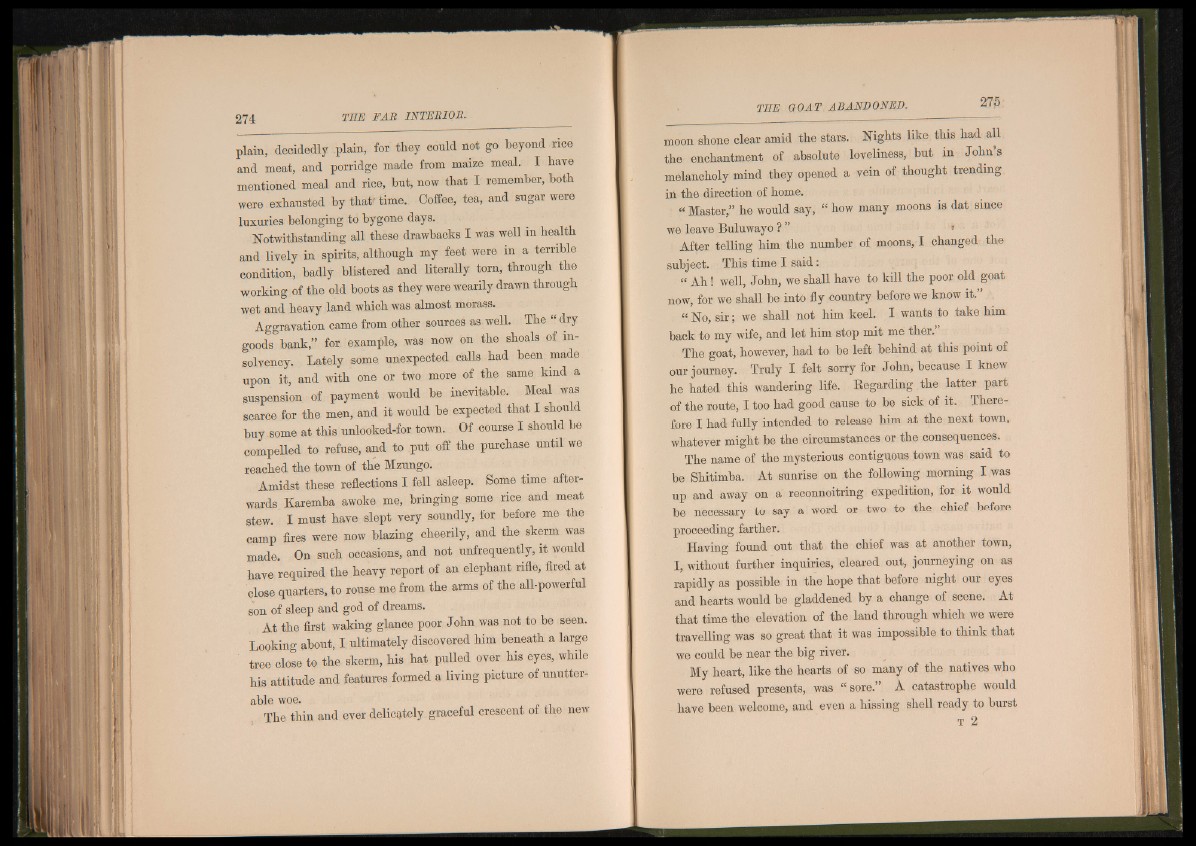
plain, decidedly plain, for they eonld not go beyond rice
and meat, and porridge made from maize meal. I have
mentioned meal and rice, hut, now that I remember, both
were exhausted by th a t time. Coffee, tea, and sugar were
luxuries belonging to bygone days.
Notwithstanding all these drawbacks I was well m health
and lively in spirits, although my feet were m a terrible
condition, badly blistered and literally torn, through the
working of the old boots as they were wearily drawn through
wet and heavy land which was almost morass.
Aggravation came from other sources as well. The “ dry
goods bank,” for. example, was now on the shoals of insolvency.
Lately some unexpected calls had been made
upon it, and with one or two more of the same kind a
suspension of payment would be inevitable. Meal was
scarce for the men, and it would be expected that I should
buy some at this unlooked-for town. Of course I should be
compelled to refuse, and to put off the purchase until we
reached the town of the Mzungo.
Amidst these reflections I fell asleep. Some time afterwards
Karemba awoke me, bringing some rice and meat
stew. I must have slept very soundly, for before me the
camp fires were now blazing cheerily, and the skerm was
made. On such occasions, and not unfrequently, it would
have required the heavy report of an elephant rifle, fired at
close quarters, to rouse me from the arms of the all-powerful
son of sleep and god of dreams.
At the first waking glance poor John was not to be seen.
Looking about, I ultimately discovered him beneath a large
tree close to the skerm, his hat pulled over his eyes, while
his attitude and features formed a living picture of unutterable
woe. ' ' ' '
The thin and ever delicately graceful creseent of the new
moon shone clear amid the stars. Nights like this had all
the enchantment of absolute loveliness, but in Johns
melancholy mind they opened a vein of thought trending
iU the direction of home.
“ Master,” he would say, “ how many moons is dat since
we leave Buluwayo ? ” »
After telling him the number of moons, I changed the
subject. This time I said:
“ A h ! well, John, we shall have to kill the poor old goat
now, for we shall be into fly country before we know it.”
“ No, s ir; we s h a ll not him keel. I wants to take him
back to my wife, and let him stop mit me ther.”
The goat, however, had to be left behind at this point of
our journey. Truly I felt sorry for John, because I knew
he hated this wandering life. Regarding the latter part
of the route, I too had good cause to be sick of it. Therefore
I had fully intended to release him at the next town,
whatever might be the circumstances or the consequences.
The name of the mysterious contiguous town was said to
be Shitimba. At sunrise on the following morning I was
up and away on a reconnoitring expedition, for it would
be necessary to say a word or two to the chief before
proceeding farther.
Having found out that the chief was at another town,
I, without further inquiries, cleared out, journeying on as
rapidly as possible in the hope that before night our eyes
and hearts would be gladdened by a change of scene. At
that time the elevation of the land through which we were
travelling was so great that it was impossible to think that
we could be near the big river.
My heart, like the hearts of so many of the natives who
were refused presents, was “ sore.” A catastrophe would
have been welcome, and even a hissing shell ready to burst
t 2